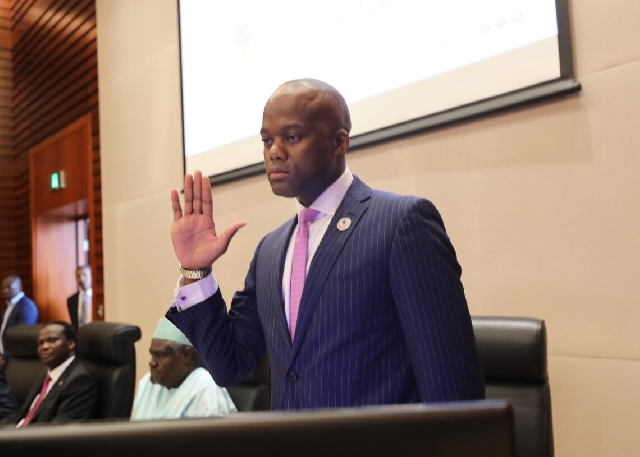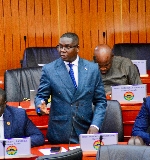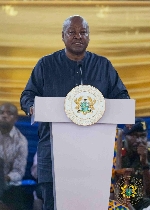Ghana's diasporans must cash in on Africa's $3.4 trn GDP via AfCFTA – Mene
 Wamkele Mene
Wamkele Mene
The Ghanaian diaspora community needs to take advantage of the opportunities presented by the African Continental Free Trade Area (AfCFTA) by harnessing the trade and investment engagements within the country, Secretary-General Wamkele Mene has said when he spoke on the theme: ‘The Role of Ghana’s Diaspora in harnessing investment opportunities presented by the AfCFTA’ at a forum organised by the Ghana Investment Promotion Centre on Thursday, June 24, 2021.
Mr Mene said “this will enable them take advantage of the continental market size of more than one billion people with an aggregated gross domestic product of $3.4 trillion created by the Agreement”.
Efforts to attract the diaspora, he noted, “could focus on three key economic areas: investments, knowledge and skills and trade facilitation”, adding: “In terms of investments, mechanisms could be put in place to tap the diaspora as preferred foreign direct investors in continental development projects”.
From the perspective of knowledge and skills, Mr Mene noted that “the diaspora could provide long-and short-term human capital support in strategic sectors driving Africa’s economic growth”.
Human capital support, he observed, “can begin with knowledge transfer from the diaspora back to the home country through collaboration, mentoring and training”.
Regarding the trade access and facilitation dimension, the AfCFTA Secretary-General said “the diaspora could serve as market entry facilitators, importers, distributors and co-investors for African export initiatives targeting global markets”.
For diasporans, he noted that the continent is “enticing as an investment destination on many fronts”.
It remains the continent with the “fastest-growing economies as well the youngest globally”, he added. “The continent’s youth dividend will also make the continent attractive as a potential global manufacturing base. The mobile telephone revolution will facilitate not just intra-Africa trade but also enable real-time communications with diasporans”.
He said the next wave of investment into African markets should be “forward-looking, focusing on sectors that will define the continent’s growth in the coming years”.
The past decade, he mentioned, “saw FDI flow into areas such as telecommunications, consumer products, and industrials, but mobile penetration, Covid-19 dynamics, and growing energy demand are creating opportunities in new sectors including the following: infrastructure, agro-processing, financial technology (FINTEC), energy, and healthcare”.
Read Mr Mene’s full speech below:
H.E. WAMKELE MENE
SECRETARY-GENERAL, AfCFTA SECRETARIAT
TOPIC
The Role of Ghana’s Diaspora in harnessing investment opportunities presented by the AfCFTA
24 June 2021
Introduction
I am pleased to join you today to take stock of the role of the Ghanaian diaspora in harnessing opportunities of the African Continental Free Trade Area.
A key point I would like to emphasize is that the diaspora has positive development potential which when well harnessed will help mitigate the development challenges of Africa and Ghana, respectively.
Over the years, links between the African diaspora and Africa have grown, especially since the recognition by the AU of the African diaspora as its “Sixth African Region” in 2003, complete with an administrative unit at the AU headquarters. Also, contributing to this positive development is the adoption in May 2012 of a Declaration that paved way for the development and implementation of the AU Diaspora Programme. And the Diaspora Engagement Project is an initiative of this programme.
However, there is still potential to enhance the engagements not just in dealing with the challenges of Covid-19 but also in the pursuit of national economic development and the AU’s Agenda 2063, ‘The Africa We Want’, as well as the United Nation’s Sustainable Development Goals.
Aside from economic impact, countries that have benefitted most from their diaspora have engaged this group and implemented policies to recognize their role and give them incentives to invest and reduce costs of doing business.
The Ghanaian diaspora has a significant role to play in government’s developmental effort; in building a Ghana Beyond Aid.
Thankfully, Ghana does not have to reinvent the wheel in forging a meaningful link with its African diaspora since a number of initiatives have already been undertaken toward deepening the cultural linkages and bridging the physical divide between the African (Ghanaian) diaspora and the country.
Initiatives such as the highly successful “Ghana Year of Return” in 2019, designed to symbolise 400 years since the first enslaved African arrived in Jamestown, Virginia in 1619, resonated with the African American community in the United States and served to further inculcate linkages between Ghana and the diasporan counterparts.
Going forward, such initiatives could be reimagined to extend beyond tourism and target foreign direct investment and business partnerships, focusing on untapped but potentially high-yielding economic sectors.
The AfCFTA agreement, whose implementation commenced on January 1, 2021, provides a platform where the African diaspora can play an important role in the economic development of their countries of origin and the continent. There is now increased and diversified opportunities to promote trade and foreign direct investment, create businesses and spur entrepreneurship, transferring new knowledge and skills within the AfCFTA market.
Currently, almost 69% of countries that have signed the agreement have deposited their instruments of ratification which means that they have legally accepted the obligations to open their markets, reduce their barriers to trade, reduce barriers to investment and to adhere to this single set of rules for trade and investment on the African continent. This is an unprecedented achievement for Africa.
By providing a large and attractive market, with reduced cross border barriers, investors can undertake larger revenue projects on a regional rather than national scale. The AfCFTA, therefore, offers an apt response to the reluctance of investors to invest in small, fragmented and uncompetitive national markets.
As you may well know, Phase I of the AfCFTA aims to reduce significantly, tariffs and non-tariff barriers to goods and advance in the liberalisation of trade in services. Phase II, involves agreements on investment, competition policy and intellectual property (IP) rights, while Phase III will involve provisions on e-commerce. On the basis of the timetable set by the African Union for Phase II negotiations, we can hope to see a fully developed Investment Protocol by December 2021.
The AfCFTA investment rules will likely include substantive investment protections and a separate set of rules for the resolution of investment disputes. Meanwhile, while we are about to start working on the Protocol on Investments, the Protocol on Trade in Services already negotiated has provisions regarding investment: one of the general objectives is to “foster domestic and foreign investment”.
AfCFTA also enhances the value proposition for investment by reducing risk. AfCFTA includes a protocol for the resolution of investor-state disputes. This protocol, should make investment in Africa less risky for the investors and for African countries.
Furthermore, the negotiation and effective implementation of the phase II protocol on intellectual property rights (IPRs), under the AfCFTA, will create a strong enabling environment for IP creation, protection, administration and enforcement which will stimulate innovation and competitiveness of the business sector. IPRs provide incentives to inventors to develop new knowledge and the right to obtain a patent for an invention, for example, encourages the investment of money and effort in research and development.
The Ghanaian diaspora community needs to take advantage of the opportunities presented by the AfCFTA, by harnessing the trade and investment engagements within the country. This will enable them take advantage of the continental market size of more than one billion people with an aggregated gross domestic product of $3.4 trillion created by the Agreement.
Efforts to attract the diaspora could focus on three key economic areas: investments, knowledge and skills and trade facilitation. In terms of investments, mechanisms could be put in place to tap the diaspora as preferred foreign direct investors in continental development projects.
From the perspective of knowledge and skills, the diaspora could provide long-and short-term human capital support in strategic sectors driving Africa’s economic growth. Human capital support can begin with knowledge transfer from the diaspora back to the home country through collaboration, mentoring and training.
Regarding the trade access and facilitation dimension, the diaspora could serve as market entry facilitators, importers, distributors and co-investors for African export initiatives targeting global markets.
For diasporans, the continent is enticing as an investment destination on many fronts. It remains the continent with the fastest growing economies as well the youngest globally. The continent’s youth dividend will also make the continent attractive as a potential global manufacturing base. The mobile telephone revolution will facilitate not just intra-Africa trade but also enable real-time communications with diasporans.
The next wave of investment into African markets should be forward-looking, focusing on sectors that will define the continent’s growth in the coming years. The past decade saw FDI flow into areas such as telecommunications, consumer products, and industrials, but mobile penetration, Covid-19 dynamics, and growing energy demand are creating opportunities in new sectors including the following: infrastructure, agro-processing, financial technology (FINTEC), energy, and healthcare.
Conclusion
The COVID-19 pandemic has created a global crisis, but also an opportunity to reframe diaspora engagement with African nations. With the launch and operationalization of the AfCFTA, the discourse about Africa is shifting from one of challenges and “gaps” to one about opportunities and prospects. Africa is now receiving a high level of interest as an investment destination from investors from across the globe. Indeed, the AfCFTA is creating a new narrative that should inspire the African diaspora, to explore opportunities in the continent and invest in the various sectors.
As the pandemic begins to ease and economic recovery of the African economies get underway, diasporans all over the world are welcome to join and contribute to this historical endeavour of fostering a strong, and sustainable African integration.
Today, the case for investing in Africa is stronger than ever. Africa will remain a competitive investment destination for decades to come because of its improving relative risk profiles, demography and continental integration.
I encourage African diasporans to invest in the Africa market. The time is now to invest in Africa.
I invite you to join us as we integrate our economies and fulfil the dreams of the founding fathers of the OAU/AU, and thereby assist you in expanding your businesses on the continent.
Source: classfmonline.com
Trending News

Dr Gideon Boako urges NAiMOS task force to step into Tano North galamsey crisis
13:20
Ga Mantse joins Asantehene at police headquarters to strengthen traditional–police collaboration
12:51
Cape Coast Assembly presents 8-year development plan to gov't
13:48
GTEC directs UG to reverse fee hikes by Jan. 12
11:54
NDC Regional Chairman extends annual support to vulnerable groups in Assin Foso
02:59
Mahama condemns GNFS assault on Class FM's journalist
13:16
Lands and Mines Watch Ghana defends GoldBod licence issued to Bawa Rock
12:06
77th Annual New Year School and Conference opens at University of Ghana
13:15
Gov’t condemns alleged assault on Class Media Group journalist
11:53
Margins Group reaffirms commitment to innovation and service delivery as 2026 begins
02:35



